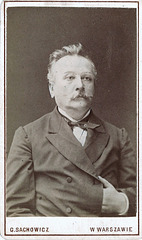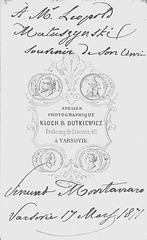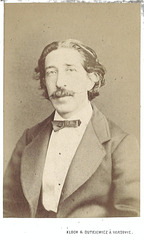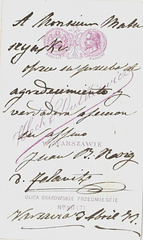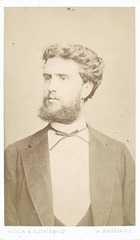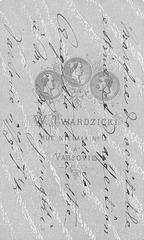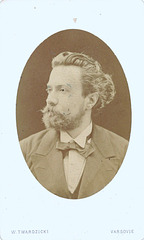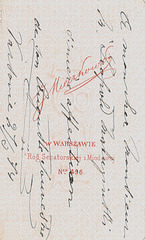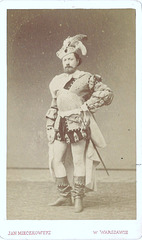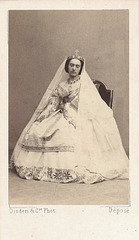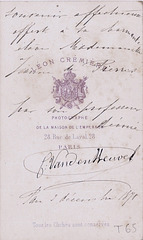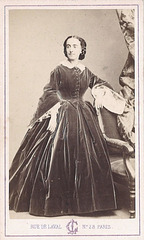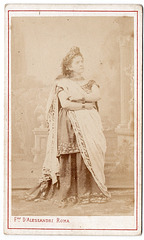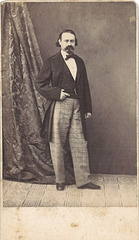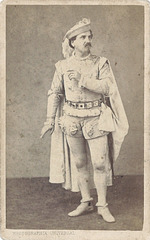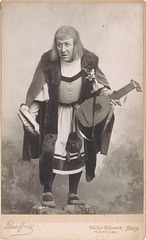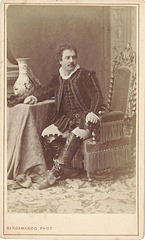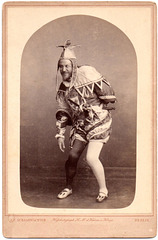
19th century opera singers
Leopold Matuszynski by Sachowicz
| |
|
Leopold Matuszynski (1820-1893); Polish tenor. He made his debut in 1841 at the Warsaw Grand Opera "Teatr Wielki" in Bellini's "La somnambula". After his singing-career he worked at the Teatr Wielki as a stage-director.
The dedications on the previous photo's of Juan Bou Roig, Vincenzo Montanaro and Augusto Souvestre were made to him.
Vincenzo Montanaro's autograph at the back
| |
|
Vincenzo (Vincent) Montanaro (1828-1917); Italian tenor.
The dedication is to the Polish tenor and stage-director Leopold Matuszynski (1820-1893). See one of the next photo’s.
Vincenzo Montanaro by Kloch & Dutkiewicz
| |
|
Vincenzo (Vincent) Montanaro (1828-1917); Italian tenor.
He made his debut in 1852 at the Teatro Fondo of Naples in Rossini’s “L’Italiana in Algeri”.
Juan Bou Roig's autograph at the back
| |
|
Juan Bou Roig (1849-1901); Spanish tenor.
The dedication is to the Polish tenor and stage-director Leopold Matuszynski (1820-1893). See one of the next photo’s.
Juan Bou Roig by Kloch & Dutkiewicz
| |
|
Juan Bou Roig (1849-1901); Spanish tenor.
He studied voice on the island of his birth (Mallorca) and made his debut at the age of 20 at the Teatro Principal de Palma in Rossini's opera "Guillaume Tell". He toured the opera houses in Spain and Italy (1869-1895); in Italy under the name Giovanni Roig. He had a wide repertoire: Der Freischütz (Von Weber), La favorite (Donizetti), Ernani (Verdi), L'Africaine (Meyerbeer), Faust (Gounod), Mefistófele (Boïto), La Gioconda (Poncielli, Un Ballo in Maschera (Verdi), La Traviata (verdi) etc.
He retired from the stage in 1895 because of a malady and he settled in his hometown Felanitx on Mallorca, where he became city manager at the Townhall.
Augusto Souvestre's autograph at the back (2)
| |
|
Augusto (Auguste) Souvestre (1839-1910); Italian baritone.
The dedication is to the Polish tenor and stage-director Leopold Matuszynski (1820-1893). See one of the next photo’s.
Augusto Souvestre by Twardzicki
| |
|
Augusto (Auguste) Souvestre (1839-1910); Italian baritone.
A singer who had his career at the minor opera houses in Italy and eastern Europa.
Augusto Souvestre's autograph at the back (1)
| |
|
Augusto (Auguste) Souvestre (1839-1910); Italian baritone.
The dedication is to the Polish tenor and stage-director Leopold Matuszynski (1820-1893). See one of the next photo’s.
Augusto Souvestre by Mieczkowski
| |
|
Augusto (Auguste) Souvestre (1839-1910); Italian baritone.
A singer who had his career at the minor opera houses in Italy and eastern Europa.
Caroline Duprez-Van den Heuvel by Disdéri (3)
| |
|
Caroline Duprez (1832-1875); French soprano and daughter of the tenor Gilbert Duprez (1806-1896) and the soprano Alexandrine Duperron-Duprez (1808-1871). She made her debut in 1850. She sang at various premières: Auber's "Marco Spada" (1852), Meyerbeer's "L'étoile du Nord" (1854), Auber's "Jenny Bell" (1855), Massé's "saisons" (1855), Halevy's "Valentine d'Aubigny" (1856) and Massé's "Fior d'Aliza" (1866). In 1852 she sang the première of "Juanita", an opera written by her father Gilbert Duprez. Because of her poor health she ended her career early and died at the age of 43.
On the photo she is seen as Catherine in Meyerbeer's "L'Étoile du Nord", the role she created in 1854.
Caroline Duprez-Van den Heuvel's autograph at the…
| |
|
Caroline Duprez (1832-1875); French soprano and daughter of the tenor Gilbert Duprez (1806-1896) and the soprano Alexandrine Duperron-Duprez (1808-1871).
The dedication in French reads as follows:
Souvenir affectueux offert à sa charmante élève Mademoiselle Jeanne de Pierris par son professeur dévoué
C. Van den Heuvel
Pau 3 décembre 1871
Caroline Duprez-Van den Heuvel by Crémière
| |
|
Caroline Duprez (1832-1875); French soprano and daughter of the tenor Gilbert Duprez (1806-1896) and the soprano Alexandrine Duperron-Duprez (1808-1871). She made her debut in 1850. She sang at various premières: Auber's "Marco Spada" (1852), Meyerbeer's "L'étoile du Nord" (1854), Auber's "Jenny Bell" (1855), Massé's "saisons" (1855), Halevy's "Valentine d'Aubigny" (1856) and Massé's "Fior d'Aliza" (1866). In 1852 she sang the première of "Juanita", an opera written by her father Gilbert Duprez. Because of her poor health she ended her career early and died at the age of 43.
Carlotta Marchisio by d'Alessandri (1)
| |
|
Carlotta Marchisio (1835-1872); Italian soprano. She made her debut in 1856 at the Teatro Real de Madrid as Norma in Bellini's eponymous opera. She performed almost always together with her sister Barbara Marchisio. They were protégé's of Rossini and he wrote the Petit Messe Solennelle especially for their voices. She died early at the age of 36 while giving birth to her daughter Margherita. Ten days before her 9-year old son Giachino (named after Rossini) had died.
On the photo she is seen as Saffo in Pacini's eponymous opera.
Pietro Mongini by Unknown
| |
|
Pietro Mongini (1828-1874); Italian tenor who created the role of Radamès in Verdi's "Aïda" in Cairo (1871) on the occasion of the opening of the Suez Canal. He began his singing career as a bass and in 1851 he made his debut as such. In the year after he was retrained to tenor and he had his first success in Genoa. In 1855 he made a guest appearance at the Théâtre-Italien and in 1858 at La Scala. In 1857/58 and 1861/62 he triumphed at St.Petersburg and in the years 1858-1873 he sang regurlarly at the three major London opera houses (her Majesty’s Theatre, Drury Lane Theatre and Covent Garden). He sang at the London première of Verdi’s “I Vespri Siciliani” (1859) and “La forza del destino” (1867). In 1874 he died suddenly in Milan at the age of only 45.
On the photo he is seen in the library of the Sao Carlo Teatro at Lisbon in 1862.
For that season he was contracted for 6 opera’s: Donizetti’s “Les Martyrs” and “Lucia di Lammermoor” and Verdi’s “I Lombardi” , “I Vespri Siciliani”, “Rigoletto” and “Un Ballo in Maschera”.
Emilio Naudin by Photographia Universal
| |
|
Emilio Naudin (1823-1890); Italian tenor.
In 1843 he made his debut at Cremona in Pacini’s opera “Saffo”. In the following years he performed successfully at the leading Italian opera houses, especially at Genua and Rome. He also made a successful international career and sang at Vienna, St. Petersburg, London, Paris, Berlin, Lisbon and Cairo. In 1865 he created the rôle of Vasco da Gama in Meyerbeer's "L'Africaine". At Covent Garden he performed in 1867 the role of Don Carlos in the English première of Verdi’s eponymous opera. Also at Covent Garden he sang at the première of Poniatowski’s “Gelmina” (1872), an opera that was dedicated to Adelina Patti who sang the lead role.
Maurice Renaud by Duguy (1)
| |
|
Maurice Renaud (1861-1933); French baritone.
In 1883 he made his début at Brussels (La Monnaie) and remained with that company until 1890. In 1884 he created at La Monnaie the rôle of the high priest of Odin in Ernest Reyer's “Sigurd” and in 1890 the rôle of Hamilcar in the première of Reyer’s “Salammbô”. He would re-appear at the Monnaie in the period 1908-14. In October 1890 he joined the Opéra-Comique making his debut as Karnac in Lalo’s “Le roi d’Ys”. The following year he moved to the Grand Opéra, making his debut as Nelusko in Meyerbeer’s “L'Africaine”. He continued to appear at the Grand Opéra regularly until 1914. He made guestappearances in London (Covent Garden), Milano (La Scala), Berlin (Royal Opera), St. Petersburg (Royal Opera) and in Monte Carlo. In New York he was engaged by the Manhattan Opera House (1906-1910) and the Metropolitan Opera (1910-1912); he made guest appareances at Boston, Chicago and New Orleans. In 1919 he retired from the stage.
On the photo he is seen as Sixtus Beckmesser in Wagner’s “Die Meistersinger von Nürnberg”.
Antonio Cotogni by Bergamasco
| |
|
Antonio Cotogni (1831-1918); Italian baritone.
In 1852 he made his debut in Rome as Belcore in Donizetti’s “Elisir d’amore”. In the following years he sang at Turin, Nice, Rome, Milano, London, St. Petersburg and he made guest appearances at Moscow, Barcelona, Madrid and Lisbon. In 1867 he performed Posa in the Italian première of Verdi’s “Don Carlos” at Bologna. At St. Petersburg he sang in 26 successive seasons and here he gave his last performance in 1898 in Donizetti’s “Don Pasquale”. From 1894 he was a singing teacher (first at St. Petersburg and later at Rome); among his pupils were famous singers as Mattia Battistini, Jean de Reszke, Giacomo Lauri-Volpi, Carlo Galeffi and Beniamino Gigli.
In 1908 –at the age of 77- he made a grammophone record with the tenor Francesco Marconi: the duet from “I Mulattieri” by Masini
www.youtube.com/watch?v=iO332JlAWoA
Francisco d'Andrade by Schaarwächter (1)
| |
|
Francisco d’Andrade, born Francisco Augusto de Andrade E Silva (1859-1921); Portuguese baritone.
He was the son of a jurist; initially he also studied law, but from 1881 on he received singing lessons by Manuel Carreira, Luiz da Costa and José Romano in Lisbon. From 1886 on further vocal training in Milan, where he was the pupil of the voice teachers Miraglia and Ronconi. In 1882 he made his stage debut at San Remo as Amonasro in Aïda. In the following years he had his first success in Italy, Spain and Portugal, including at La Scala Milan and at the Teatro Costanzi in Rome. In 1886 he made a guest appearance at Covent Garden London in Verdi’s “Ballo in maschera”, where he had great success till 1890, e.g. as Giorgio Germont in “La Traviata”, as Enrico in “Lucia di Lammermoor” and as Count Luna in “Il Trovatore”. In 1886 he performed at Moscow as Telramund in “Lohengrin” and also as Wolfram in “Tannhäuser”, one of the few non-Italian rôles that he sang.
In 1888 – at the Teatro San Carlo Lisboa- he sang at the première of “Donna Bianca” , an opera by the Portugese composer Alfredo Keil.In 1889 he came to Berlin with an opera company of impressario Gardini. He was so succesfull with his performances as Figaro in “Barber of Seville”, as Rigoletto and above all as Don Giovanni, that he decided to settle in Berlin. From 1906-1916 he was a regular singer at the “Berliner Hofoper”. From 1891-1910 he was almost every year a guest at the Frankfurt Opera; also at the Zürich Opera in the years 1894,1896, 1901 and 1909. Guest appearances led him to music centers in Germany, Holland, Austria, Russia, England and Scandinavia, most of the time in the rôle of Don Giovanni. In this rôle he was considered to be unmatched; his fascinating portrayal of Don Giovanni was recorded in several famous paintings by his friend the painter Max Slevogt. He performed on stage till 1919; ultimately only as Don Giovanni. Another star-rôle was Figaro in Rossini’s “Barber of Seville”. He dominated a stage repertory of 56 rôles in six languages. When Portugal entered the first World War, he had to leave Berlin and Germany. He lived then in Portugal, where in May 1918 he was on the stage for the last time (Figaro). In 1919 he returned to Berlin but two years later he suddenly died of a stroke. In 1906 Francisco d’Andrade made 10 gramophone records for the Lyrophon Company. He was the younger brother of the tenor Antonio d’Andrade (1854-1942).
On the photo from Berlin 1891 he is seen as Rigoletto in the eponymous opera by Verdi.
Jump to top
RSS feed- Latest items - Subscribe to the latest items added to this album
- ipernity © 2007-2024
- Help & Contact
|
Club news
|
About ipernity
|
History |
ipernity Club & Prices |
Guide of good conduct
Donate | Group guidelines | Privacy policy | Terms of use | Statutes | In memoria -
Facebook
Twitter

